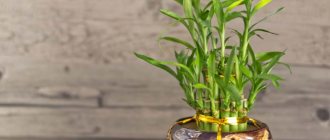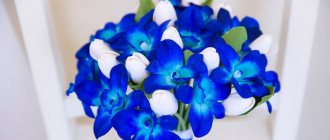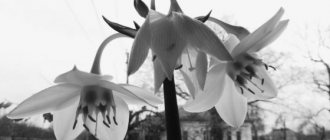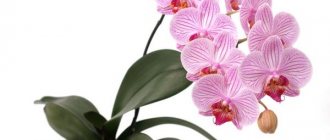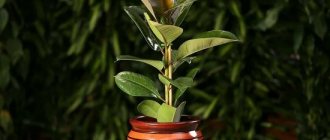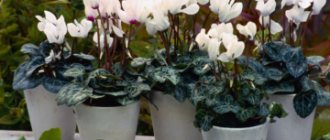Climbing indoor vines are very popular among gardeners. Wax ivy is one of these plants, but the bad omens associated with it force many to give up growing the flower at home. Some people think that Hoya brings only bad luck, although there are many good things about it. Before making hasty conclusions about a luxurious liana, you need to learn more about its influence on different areas of the life of its owners.
What does the flower symbolize?
Hoya is an evergreen liana-like shrub from the Kutrovaceae family. Its natural habitat is the tropical forests of East Asia. To those who look at hoya, it seems that it is artificial. The dark green leaves have a rough texture and the flowers appear to be cast from wax. Thin shoots of vines at home grow up to 5 meters in length. A beautiful plant attracts the eye and delights people.
Do not confuse hoya fleshy, which is often called wax ivy, with common ivy (hedera). These are completely different plants belonging to different families, although they have some similarities.
Hoya is an evergreen plant, so it symbolizes youth and immortality. She is associated with such qualities as coquetry and curiosity. She is often compared to a young girl who, due to her young age, continues to behave childishly. According to signs and superstitions, growing indoor ivy at home can bring invaluable benefits to its owners, but some believe that it can harm household members.
https://youtu.be/https://www.youtube.com/watch?v=sb2WSvJW6lQ
_
General information
Its natural habitat is the humid subtropical regions of Asia, Africa and Europe.
There the plant can reach a length of 30 meters, and sometimes in gardens too. The size of indoor ivy is, of course, more modest, but in the variety of species the flower is not inferior to its natural “brother” - there are more than a hundred forms, differing in color, leaf shape, and size.
Human attention has always been drawn to ivy : sometimes it was extolled, as in Ancient Greece, considered a symbol of love, or it was feared that, according to signs, ivy could cause harm to a person, attracting troubles and troubles.
The plant has also found application in medicine; medicinal tinctures and other preparations are prepared from it.
Indoor ivy: can you keep it at home, signs and superstitions
This houseplant is even sometimes called a “husband buster,” supposedly because it can destroy the relationships of loved ones, so some believe that it should not be kept in the house.
The problem interested psychoanalysts, who made the following conclusion: ivy is capable of absorbing (like many of our other green helpers) tobacco smoke, substances toxic to humans emitted by varnished furniture, any “chemistry”, for example, fumes from aerosols, household drugs, but in addition to all this, it can absorb bursts of aggressive energy.
This amazing ability distinguishes ivy from many other representatives of domestic flora and gives rise to various superstitions.
This quality, according to experts, can be used for “peaceful purposes” by placing the flower in a room where there are hyperactive children - home ivy will act as a sedative , or keep it in a room where not the most pleasant guests often drop in to neutralize that negativity which they will bring with them.
Most popular varieties
Ivy looks especially interesting in the interior if it comes in different varieties. Popular species include hoya (wax), Canary ivy, Colchian ivy, English ivy, and hedera.
Hedera
Canary ivy
A distinctive feature of this variety of ivy is the absence of aerial roots, so the owner must take care of reliable support for the vine and regularly provide “hairdressing services” to the pet.
Among the “Canaries” there are varieties:
- "Gloire de Marengo" (with reddish stems);
- “Golden leaf” (golden shades are added to the main color);
- "Brigitta" (this variety has the smallest star-shaped leaves, and the stems are distinguished by grace).
Colchis ivy
The leaves of Colchis ivy are even larger than those of the “Canary”, their average dimensions are 25x17 cm. The leaves are usually whole, very rarely three-lobed.
Unlike other varieties, Colchis ivy smells pleasantly of nutmeg. Here are the varieties offered for home breeding:
- "Dentata Variegata" (oval leaves, pale yellow at the edges);
- "Sulfur Heart" (leaves curl slightly inward);
- "Arborescens" (produces the effect of "drooping" shoots).
Variegated
- It is placed in the living room or kitchen (in a flowerpot).
- Unlike its undemanding counterparts, this species needs the sun, otherwise it loses its colors, fades and even ceases to live up to its name.
English ivy
This species can be formed as a columnar tree or as a hanging crop. Not only the color, but also the shape of the leaves is striking in variety - they can be elongated, lobed and even heart-shaped. The plant has aerial roots.
Flowers appear only on a sunny windowsill (the “Englishman” will not bloom in the shade), they are small, yellow, grouped into “umbrellas”, but, alas, smell unpleasant.
The resulting berries of a thick, almost black purple color will also not please you - they are poisonous, which means that English ivy cannot be grown in a house where there are small children who are used to trying everything by taste. Among the varieties used in indoor floriculture:
- "Harald" (with round leaves);
- "Sagittaefolia" (with leaves shaped like a star);
- "Ivalace" (with corrugated edges);
- "Mona Lisa" (in yellow tones).
Wax ivy hoya
This variety is distinguished by fleshy glossy leaves. Aerial roots form on stems, which in young plants are soft and can be given any desired direction. However, over time, the stems become woody, so it becomes increasingly difficult to give them any shape.
In nature, hoya finds shelter in the shade of tall trees; at home, the plant is also not very demanding on lighting - only in winter will ivy need a south window, which provides more light. Therefore, caring for wax ivy at home is not difficult.
At other times of the year, windows facing west and east will be most suitable. This does not prevent the plant from delighting its owners with flowering: the fragrant star flowers are collected in baskets and look very elegant. Learn more about caring for Hoya wax ivy here.
Indoor ivy: care at home
Proper care of indoor ivy is the key to the fact that the plant will delight you and delight your guests for many years.
Selecting a location
- Choosing a place is not only about light (especially since most species of this vine prefer shade and can be grown even deep in the room), it is also about support for the stems, an opportunity to grow and develop.
- For hanging varieties, for example, a place at home near the wall is suitable - young shoots will be provided with sufficient space.
- ATTENTION : this culture does not like moving, so you should try to immediately choose a permanent place for the green pet, where it will be comfortable.
Soil, pots
The soil required is slightly acidic. Composition – different types of soil (turf, humus, leaf), sand and peat. All components must be taken equally, and treated with a solution of potassium permanganate before use.
- You can not only prepare the composition yourself, but also purchase it in a specialized store - the “Universal” flower mixture is suitable for ivy.
- A drainage layer (made of expanded clay, crushed brick or pebbles) is poured onto the bottom of the pot; its height is from 3 to 5 cm.
- The soil covering it should be loose and allow both moisture and air to pass through.
- The root system of this indoor flower is superficial, so a very deep ivy pot is not needed.
The best option is a medium-sized container that is stable enough and made of high-quality material to last for several years. When the time for replanting comes, you will need a pot 2-3 times larger than the first, not very deep, but with a large diameter.
Watering and fertilizing
This indoor flower especially needs watering in the summer - the soil must remain moist at all times. In winter, watering is reduced to a minimum, and sometimes completely abandoned. However, you still cannot forget about the green pet, otherwise a brown edging will appear on the edges of the leaves, they will begin to dry out and fall off.
- For irrigation you will need soft water.
- You can take tap water that has been standing for several days.
- In hot weather, ivy will benefit from a shower and wiping with a damp cloth.
Fertilizing is carried out twice a month, best of all with complex fertilizers that are quickly absorbed. In the cold season, the number of feedings is reduced by half.
Planting and transplanting
If you decide to get ivy for the first time, it is best to plant it using a cutting, asking your friends for it. Each shoot node has root primordia, so planting and rooting of the future plant will take place quickly and without problems.
The need for replanting arises when roots begin to emerge from the hole in the bottom of the pot. If you do not wait for this moment, then it is advisable to adhere to the following schedule: transplant young plants into a new pot every year, older flowers - once every two years, adult specimens do not need to be disturbed, but only carefully replace the top layer of soil with fresh substrate.
Propagation of ivy at home
If you have ivy at home, consider that you have provided yourself with planting material. All that remains is to choose the best way to do this - using cuttings, layering or shoots.
From seeds
It is quite difficult to propagate ivy from seeds at home, and all because your own seeds simply do not have time to ripen.
Those purchased externally, unfortunately, very rarely have varietal characteristics, especially of the specific type that may interest you. In addition, the germination process itself is difficult (in the natural environment, seeds undergo pre-treatment in the stomachs of birds, which activates their germination).
Seeds usually sprout two weeks after they hit the ground. When the first true leaf appears, the plant needs to be pruned.
Cuttings
10 cm long apical shoots are used as cuttings. It is desirable that they have aerial roots. The cuttings are planted in pots with nutritious soil (you can have 3 pieces in one). After rooting, they are planted in separate containers. You can also germinate cuttings in water.
By shoots
When propagating ivy in this way, cut off a shoot on which 8-10 leaves are located. A cut is made along the shoot, placed on the ground and pressed into it, going two centimeters deep. After a couple of weeks, roots usually form along the entire length of the shoot. By cutting the vine into several pieces (each should contain at least 1 leaf), you get several pieces of high-quality planting material.
By layering
This method is almost the same as propagation by shoots. The difference is that the shoot is not deepened into the soil, but only pressed against it, pinned with staples.
Ivy on the balcony
- This plant perfectly decorates the balcony.
- It is most convenient to place it in a hanging basket.
- To prevent water from flowing down after watering, cover the bottom of the basket with a reliable film, pour a layer of drainage onto it, and only then add nutrient soil.
- The basket should be placed on the balcony so that the plant is not exposed to direct sunlight.
In winter, such structures are usually brought into the house so that the plant does not die, because even a glazed balcony will not protect the “subtropical guest” from sub-zero temperatures.
The ivy lashes are pre-rolled and laid on the ground so that in such a compact form the plant is waiting for warm spring days.
Possible diseases
In some diseases of indoor ivy, a person must look for his own fault. The leaves turn yellow - it means there is too much watering; dry out - the air in the room is too dry; become too small - the ivy does not get enough light.
Sometimes you have to fight aphids; one of the alarming signs is curling leaves. Spider mites can be recognized by characteristic punctures on the leaf blade and the web entangling it from below.
A white leaf on top and brown spots on the bottom warn of the presence of a pest such as yellow thrips.
Scale insects and mealybugs also pose a danger to the plant.
Magical properties of vines
According to folk superstitions, the ivy flower has very powerful energy. Here are the magical properties attributed to this plant:
- According to legend, ivy is fueled by the energy of the residents of the house. However, there is nothing wrong with this - the flower does not destroy people’s biofield and does not take away their vitality. It absorbs only bad energy, thereby purifying the space.
- It's a good sign when ivy grows in the yard. In this case, household members do not need to be afraid that a sorcerer or witch will enter the house. According to legend, the flower will protect the family from the evil eye and damage.
- It is useful for young unmarried girls to carry a leaf of wax ivy in their pocket. According to the sign, he will help you meet a worthy guy who may well become a husband.
- Those who are in a difficult life situation and cannot decide what to do best should weave an ivy wreath and put it on their head for a while. The symbolic crown will help you think clearly and rationally.
- According to legend, you can entwine a house with ivy so that it protects the family from magical influences from the outside and misfortunes.
Is it possible to keep indoor ivy in the house: an energetic explanation
This is a vampire plant. According to legends, it absorbs the energy of the surrounding space and people. But this is not always a bad thing, since the flower absorbs both positive and negative energy. Therefore, if strong quarrels regularly arise between the inhabitants of an apartment out of nowhere, you should think about getting ivy in the house.
Esotericists say that the plant “absorbs” negative thought forms that inevitably fill the space after each conflict. It is capable of permanently expelling dark egregors from the room, provoking household members to display anger, envy and other negative emotions.
Since ancient times, it was believed that indoor ivy fights both internal and external enemies of home owners. Serves as a talisman against evil spirits seeking to destroy harmony in the family.
However, it is worth remembering that, having absorbed all the negativity, ivy does not calm down, but switches to the good, positive energy of the room. While the green bindweed grows with lush shoots, the inhabitants of the house become more and more lazy, slow and apathetic.
How people treated ivy in the old days
Our ancestors were kind to wax ivy. He was credited with the ability to heal people. According to legend, a person who fell ill with whooping cough needed to drink a tincture of fleshy hoya in order to recover faster. They just took the medicine from a wooden spoon.
Read also Is it possible to keep a syngonium flower at home according to signs?
In ancient times, ivy was also used to treat various eye diseases. Those who believed in omens about this flower placed its leaf in a bowl of water for a day. The next day, the eyelids were washed with healing liquid. Previously, it was believed that even blindness could be cured in this way.
Ivy was also used in fortune telling. On the first Sunday after the celebration of the Trinity, the young men plucked 10 leaves from the plant, then put 9 under their pillow before going to bed, and threw away the last one. According to legend, the young man was supposed to dream about his future wife. If the guy already had a fiancée at that time, then with the help of this fortune-telling it was determined whether she would be the only woman, or whether another would appear in the young man’s life.
Ancient uses of ivy
In the old days, the houseplant ivy was considered a healing and also a magical herb. They were used to treat respiratory diseases, especially whooping cough, and eye diseases. It was believed that a daily water infusion of ivy leaves could help even the blind.
Fortune-telling superstitions about ivy are widely known: a young man plucked 10 leaves from a climbing branch, chose one and threw it away, and put the rest under his pillow. If your beloved was not yet there, you dreamed about her at night. When she already had a betrothed, the answer came in a dream whether the bride would be faithful for life. Believe it or not, it's everyone's choice. The main thing is what to expect from life yourself.
Bad Omens
Although hoya is a fairly popular houseplant, some are wary of it. The reason lies in superstitions that attribute negative properties to the flower. Wax ivy is called an energy vampire. If you believe the signs, his stay in the apartment can have a bad effect on the household. Vyun is often accused of causing quarrels and scandals at home. However, those who love this plant and have been growing it for many years do not notice anything like this.
According to superstition, ivy should not be used for landscaping walls in the bedroom of a baby or an elderly person. Such people have weak energy, and a vampire flower can undermine their health.
The ivy plant is associated with a sign concerning women. According to legend, married people should not bring an overgrown vine into the house, as it will destroy family ties. As a result, the husband will begin to cheat on his wife or go to live with another.
What energy does this plant carry?
Believe it or not, this “mini-liana” is a real energy vampire, fueled by the “life flows” of the owners of the house. But at the same time, bindweed can give people a sense of self-confidence (not narcissism or selfishness, but self-confidence).
Find out what awaits you today - Horoscope for today for all zodiac signs
Due to numerous requests from subscribers, we have prepared an accurate horoscope application for mobile phones. Forecasts will arrive for your zodiac sign every morning - it's impossible to miss! Download for free: Daily Horoscope 2020 (available on Android)
Esotericists advise: keeping indoor ivy is worth it in families where emotions are constantly seething. The plant will smooth out the pranks of a hyperactive child, the frantic rhythm of an overly emotional person (for example, a purebred choleric), the passions of “Italian love” in a couple. Green leaves will absorb all excess emotions - especially negative experiences “to their liking”.
Does the flower bring misfortune?
Some beliefs about this plant are so scary that many people give up the idea of growing it at home. For example, one of the signs says that hoya can kill a person with its aroma. However, this information has not been scientifically confirmed. The stems, leaves and petals of the vine do not contain toxic substances.
Only those people who have been diagnosed with asthma need to be careful. If allergens enter the respiratory tract, they can cause swelling of the mucous membranes and an attack of suffocation.
The benefits and harms of hoya for humans
Wax ivy, or hoya, to which signs and superstitions attribute magical properties, has many beneficial properties. The leaves of the plant purify the air well and release a lot of oxygen. Thanks to this, brain activity improves and performance increases. Hoya reduces the harmful effects of electromagnetic radiation emanating from household appliances. In addition, ivy secretes phytoncides that prevent the development of pathogenic microflora.
This flower is recommended to be kept at home for those who suffer from furunculosis or carbunculosis. Ivy contains substances that inhibit staphylococcus bacteria. Chiryak will ripen and open faster if you apply plant leaves to it at night.
In some cases, ivy can cause harm to humans. People with allergies should not grow it at home. During flowering, pollen enters the air, which can trigger the development of an allergic reaction. The juice from the leaves causes skin irritation in some people, so it is better to care for the flower with gloves.
Read also: What does the sign of a very itchy nose indicate?
Indoor ivy - good omens
Ivy
It is believed that if ivy grows in a room, goodness will reign in it. Psychics and bioenergetics experts claim that this plant helps resolve family conflicts and calms partners. It is recommended to buy it for easily excitable people or for hyperactive children.
There is a widespread superstition that if you keep ivy at work or in the office at home, then things will improve. This is due to the fact that the plant personifies vitality and fortitude. Therefore, timid and insecure people are advised to keep ivy at home.
It’s a good sign if a plant blooms in a married woman’s house. This suggests that her husband is faithful to her and the relationship is harmonious.
Ivy is a reliable remedy against damage, the evil eye, and envy. It absorbs the negativity of your guests. If a person comes to your house with the intention of harming you, the flower will prevent this.
Is it possible or not to keep ivy at home?
According to florists, wax ivy can be kept at home, and the signs associated with it, in most cases, have a positive interpretation. It is believed that this flower protects the home from evil. It’s not for nothing that our ancestors planted loaches near the house. They believed that in this way they could protect the family from uninvited guests, from people associated with black magic.
There are different opinions about this flower. Some are afraid to keep a loach at home because it supposedly feeds on human energy and destroys family ties. Other people are happy to grow overseas liana, considering it not only a wonderful decoration for their apartment, but also a protector from evil. Before you get a hoya, you need to find out what is really hidden under its external beauty.
Positive signs
Having studied the signs about wax ivy, it becomes obvious that it can become a real amulet for a family and bring invaluable benefits to its owners. According to popular belief, the liana helps to find harmony in relationships between spouses, prolong youth and achieve success in professional activities.
Common interpretations of good signs about hoya:
- a plant that is well cared for at home promotes peace in the family;
- According to legend, this flower calms easily excitable people, for example, rude, aggressive men, irritable women, rebellious teenagers;
- a married couple who grows a long vine from a tender shoot will live a long and happy life;
- Caring for a young plant will help single girls find love;
- For those who carry a hoya leaf in their breast pocket, the sign prophesies eternal youth and good health.
If you trust signs, the ivy flower gives confidence to pessimists. This plant is also useful for melancholy people. It will help you discover your good qualities and increase your self-esteem.
Negative signs
Those who want to grow this perennial at home need to learn more about it. Some ancient beliefs associated with loaches have a negative interpretation:
- Bringing an adult plant into the house is a bad omen. In this case, the Hoya will turn into an energy vampire. It will gradually take away the vitality of the household. However, if you grow a flower from a small sprout yourself, the bad omen will not come true.
- An unmarried girl will remain lonely if old ivy grows in her house. He will repel suitors on an energetic level. To prevent this from happening, you need to regularly renew the plant, leaving behind young shoots.
- According to legend, a flower can take revenge on its owner for poor care. Those who decide to grow a beautiful tropical liana at home will have to pay a lot of attention to it - water it on time, replant it, pinch it and feed it.
Good omens for ivy at home and in the office
According to one popular belief, the ivy flower helps to cleanse an apartment on an energetic level if strange things happen in it. For example, when there are constantly scandals in the house or husband and wife fight. If there is a person in the family with a difficult character, the plant will help tame his violent temper, taking away some of the energy.
Read also: What sign does an icon fall in the house?
Keeping Hoya in an office or study at home is useful. According to popular belief, loach improves concentration, memory, and helps to think clearly. Those who have set a goal to move up the career ladder need to plant a vine shoot in a pot and place the flower on their desktop. According to legend, fleshy hoya prevents the development of conflict situations in the work team.
Positive signs about ivy
- Ivy is a strong source of peace. Since green twigs collect strong energy, they can “absorb” harmful negativity left after quarrels.
- The plant discourages evil people who often visit you, and also cleanses the atmosphere of the house from evil thoughts left by these guests.
- Ivy “works” very well when growing near a work computer in an office. Wise people advise keeping it in the office (especially if you have a particularly harmful, loud boss or are trying to build a career).
- If a girl dreams of a family, but still can’t get along with “that” guy, “grandmothers” advise buying bindweed. It is believed that he can help her not only interest her, but also win the heart of her beloved, or finally meet her destiny.
- If the hedera is planted by a married lady, the plant will become a shield from family quarrels.
- In addition, the plant is recommended as a panacea for insecurity. Are you too timid, quiet person? Try to make friends with ivy - and maybe, when its “vines” begin to entwine one of the walls in your home, you yourself will begin to “rise” high in this life.
- If you plant a plant not in the house, but on the street (say, on the balcony, but so that the branches wrap around the balcony door and window), you will create a reliable shield that protects your home from any energetic evil coming from outside.
Where is the best place to put the plant?
Ivy is an unpretentious flower; it can grow both in a well-lit room and in partial shade. It is important to immediately choose a permanent place, because he loves permutations. If you place a pot in the marital bedroom, old feelings will flare up between husband and wife.
You can decorate the room of a schoolchild or student with creeper. According to legend, ivy growing in an apartment promotes the desire for new knowledge and helps to reveal a person’s talents. In addition, the plant awakens the desire to become independent and helps to learn to make the right decisions. However, it is better not to place the flower near the bed, but to place it on the windowsill or on the wall near the doorway.
If ivy is placed in the center of the living room, then the residents of the house will quickly recover their strength after a hard day upon returning from work or study. Even after a short stay in the room, there will be no trace of irritation and fatigue - all the negativity will be absorbed by the vine.
The interpretation will be based on the state of the flower
The flower is able to warn its owners about impending danger or trouble. It is important to carefully monitor the condition of the leaves and shoots. The most common signs about house ivy:
- Despite good care, the leaves on the plant suddenly began to turn yellow - this is a warning of an impending disease. You need to pay attention to the health status of household members and try not to ignore the first alarming symptoms.
- It is a bad omen if the ivy plant dries at home. This means that an enemy has appeared in the immediate environment, a person with bad intentions. You need to think carefully about who it could be. Perhaps this is a new acquaintance or colleague who harbors anger in his heart and wants to harm one of the family members.
- If a bush growing near the house suddenly dries up, it means that the family will face financial difficulties.
- According to legend, wax ivy blooming at the wrong time is a bad sign. It's likely that trouble will happen soon.
Everyone decides for themselves whether to believe the signs about ivy or not. Many gardeners are very happy to grow a beautiful liana in an apartment. However, they do not feel any harm from the flower. Due to its wide distribution, hoya grows in many homes, including those where various misfortunes and troubles have occurred. This is probably why the plant fell into disrepute over time. However, there are many more happy families who successfully grow this luxurious vine.
